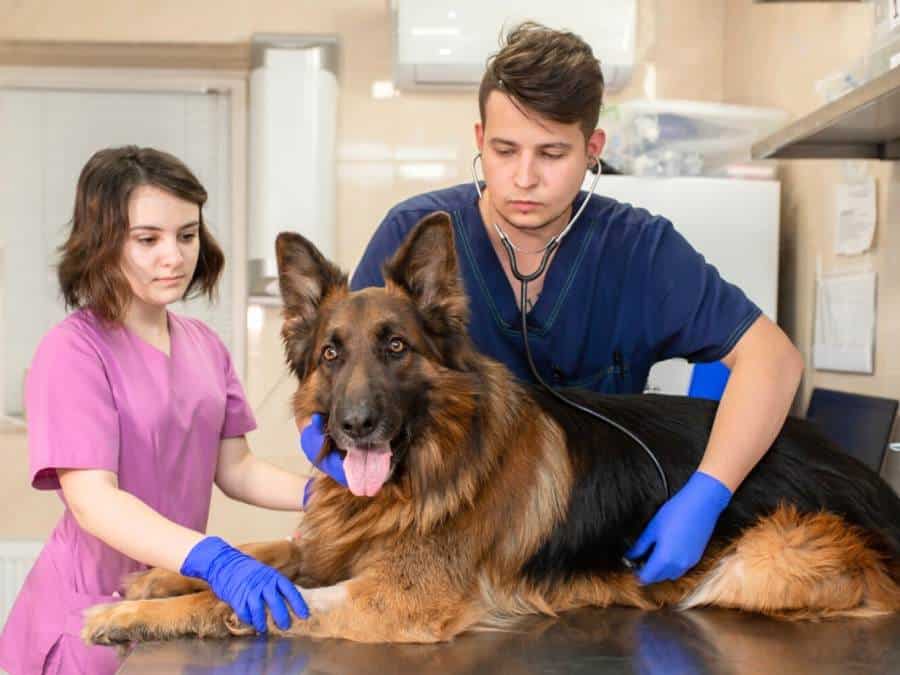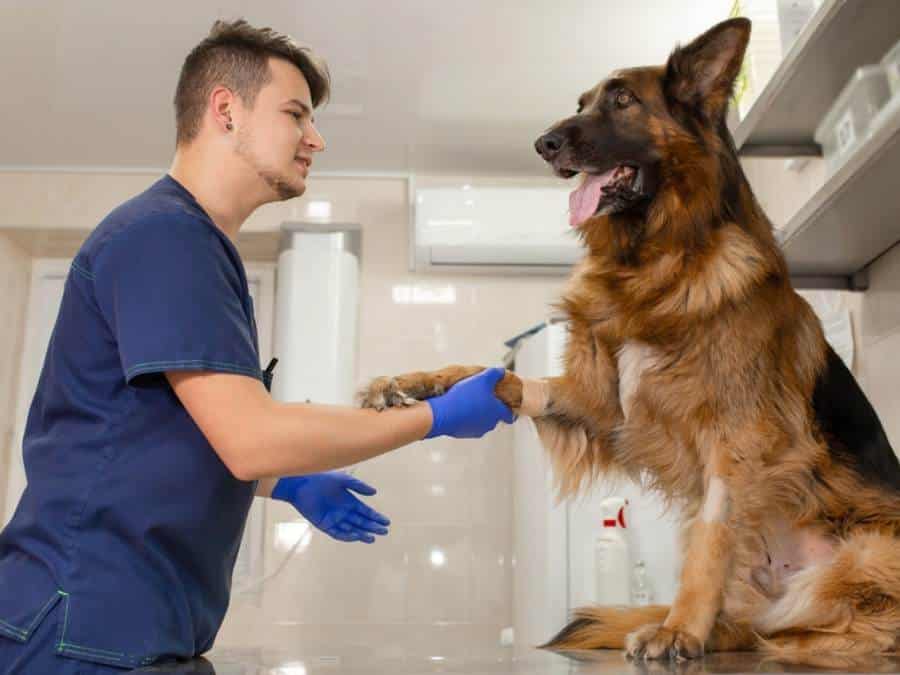Just like humans, German Shepherds are prone to various genetic disorders that can impact their health, development, and quality of life. Among these, certain conditions may present symptoms that are reminiscent of Down syndrome, a genetic disorder well-recognized in humans.
If you’ve noticed Down syndrome-like symptoms such as stunted or slow growth, a flatter face, or reduced cognitive function in your German Shepherd and worried if your furry friend could have Down syndrome then I recommend reading this article till the end.
This blog post aims to shed light on the concept of Down syndrome in German Shepherds, exploring the genetic, health, and behavioral aspects that might lead one to wonder if their dog could have this condition.
What is Down Syndrome?
Down Syndrome is a genetic condition in humans. Humans have 23 pairs of chromosomes within the nucleus of their cells. These chromosomes store the genetic material, which translates into physical traits like gender and height, personality, and intellectual traits.
Down syndrome occurs when an individual has a full or partial extra copy of chromosome 21.
This extra chromosome results in a variety of physical and developmental differences that many people associate with Down Syndrome. However, not every person with this extra chromosomal material will be affected similarly.
Down syndrome is the most common chromosomal disorder, affecting approximately 1 in every 700 babies born in the United States each year. (Source)
Individuals with Down syndrome often have specific physical traits. These can include a flat facial profile, an upward slant to the eyes, small ears, and a protruding tongue. Muscle tone is generally lower than average, and growth milestones may be delayed.
Can German Shepherds Have Down Syndrome?
Down Syndrome, as it’s known in people, is not a recognized health condition in German Shepherds, or dogs in general. However, they can experience genetic abnormalities with similar symptoms.
Genetically, humans have 23 sets of chromosomes while dogs have 39.
This significant difference in chromosomal makeup means that dogs cannot have Down syndrome in the same way humans do.
As we already discussed, Down syndrome happens when there is a full or partial extra copy of chromosome 21.
The concept of an extra chromosome in dogs would not result in the same symptoms and characteristics because their genetic and chromosomal structures are fundamentally different.
The misconception that dogs can have Down syndrome likely stems from the observation of certain symptoms and physical characteristics in dogs that resemble those seen in humans with the condition.
These might include facial abnormalities, growth issues, and delayed cognitive development.
However, these symptoms are more accurately attributed to other genetic or congenital conditions specific to dogs.
Before we delve deeper into those genetic conditions, let’s first identify the symptoms your German Shepherd might display, which could resemble those associated with Down syndrome in humans.
Symptoms in German Shepherds that May Look Like Down Syndrome
Several symptoms in German Shepherds can mistakenly lead one to think of Down syndrome due to their similarity to the human condition’s features. However, these symptoms are more likely attributable to other genetic or congenital disorders in German Shepherds.

Here’s a closer look at the symptoms that could closely resemble those associated with Down syndrome:
Abnormal facial/physical features
German Shepherd might display features similar to dwarfism, including unusual facial and cranial shapes, such as a compact neck, flattened face, undersized head, eyes that tilt upwards, and irregularly shaped ears. Their noses are often warm and dry. You might notice hair thinning, excessive shedding, and abnormal skin conditions. Limb deformities or incomplete development are also common.
Poor eyesight
German Shepherds with conditions that mirror Down Syndrome typically experience poor overall development, leading to poor eyesight. The development of cataracts is common, indicated by a cloudy appearance in one or both eyes.
Hearing difficulties
German Shepherds that seem to have Down Syndrome-related conditions may be noticeably less responsive or slower to react to auditory cues compared to their peers, potentially due to cognitive issues or hearing impairment.
Intermittent pain
Such dogs often experience random pain in various body areas, attributed to abnormal organ development and the erratic or stunted growth of bones.
Rectal discharges
Issues with digestion and waste elimination, possibly linked to the underlying condition, may result in bloody rectal discharge.
Skin issues
Skin problems are prevalent in German Shepherds with Down Syndrome-like symptoms, possibly due to impaired liver function or a compromised immune system. Heavy shedding or bald spots, along with a heightened sensitivity to common irritants, can lead to allergic reactions and additional health complications.
Thyroid dysfunction
Problems with the thyroid gland can disrupt metabolism and body temperature regulation, often leading to a lower body temperature in affected German Shepherds.
Behavioral issues
German Shepherds with these genetic conditions may exhibit unusual or problematic behaviors, such as persistent vocalizations. Puppies may show delayed development, posing challenges with feeding and housebreaking.
Now let’s explore the genetic conditions that can be mistakenly associated with Down syndrome due to their outward similarities in symptoms.
Health Conditions That Can Seem Like Down Syndrome in German Shepherds
While German Shepherds or German Shepherds, in general, cannot have Down syndrome as humans do, several health conditions in canines display symptoms that could be mistaken for it.

Understanding these conditions is crucial for providing the appropriate care and support to affected dogs.
Here’s an overview of some of these conditions:
Pituitary Dwarfism
Pituitary dwarfism in dogs is primarily caused by a deficiency in growth hormone, resulting from dysfunction in the pituitary gland. This condition is more common in young German Shepherds.
German Shepherds with pituitary dwarfism may exhibit stunted growth, retaining a puppy-like appearance into adulthood. They may also have delayed or abnormal tooth eruption and a softer, woollier coat than expected for their breed.
Treatment often involves hormone replacement therapy, but the approach can vary based on the specific needs of the dog and the progression of the condition.
Congenital Hypothyroidism
This condition results from inadequate production of thyroid hormones, which are crucial for regulating metabolism and growth. Congenital hypothyroidism can be inherited or occur due to developmental issues with the thyroid gland.
Symptoms may include stunted growth, mental dullness, lethargy, weight gain without an increase in appetite, and a thickened facial appearance.
Lifelong thyroid hormone replacement therapy is usually required to manage this condition, along with regular monitoring by a veterinarian.
Congenital Heart Disease
Congenital heart disease in German Shepherds refers to heart abnormalities present from birth. These can range from minor issues that may not significantly impact the dog’s life to severe defects that require intensive management.
Symptoms depend on the specific heart defect but can include coughing, difficulty breathing, intolerance to exercise, and episodes of weakness or fainting.
Treatment varies widely based on the type and severity of the heart defect and may include medications, dietary changes, and potentially surgery.
Congenital Hydrocephalus
Hydrocephalus is characterized by an excessive accumulation of cerebrospinal fluid in the brain’s ventricles, leading to increased pressure on the brain. It can be congenital or acquired later in life.
Symptoms may include an abnormally large head, difficulty with coordination and walking, vision problems, and seizures.
Treatment options may include medications to reduce fluid production or surgical interventions to redirect fluid flow. The prognosis depends on the severity of the condition and the success of treatment.
Portosystemic Shunt
A portosystemic shunt (PSS) is a condition where blood vessels bypass the liver, leading to insufficient detoxification of the blood. It can be congenital or acquired.
Symptoms of PSS may include stunted growth, behavioral abnormalities, seizures, and gastrointestinal issues.
Treatment often involves surgical correction of the shunt, which can significantly improve the dog’s quality of life if successful.

When Do the Down Syndrome Like Symptoms Appear in German Shepherds?
Signs of a genetic disorder usually appear early in your puppy’s life. Visible symptoms are well established after 1 or 2 years when the puppy should be fully grown. The puppy begins to show physical abnormalities and mental slowness during this time.
It might not affect his survival. But it can cause poor development of organs and body parts. His heart may be under-sized or his limbs and joints underdeveloped. His legs might not support his weight or he might have restricted or painful movements.
Understanding and recognizing these conditions can help GSD owners like us to seek the necessary care for their German Shepherds, ensuring they lead as healthy and comfortable lives as possible.
When to Consult a Vet
It’s crucial to consult a veterinarian if your dog or puppy exhibits any of the symptoms listed below:
- Unusual facial characteristics
- Stunted growth
- Issues with vision
- Difficulties with hearing
- Dermatological concerns
- Disproportionately short limbs
- Cognitive or developmental delays
- Reduced muscle strength or tone
These symptoms may indicate a congenital disorder or could stem from other health issues. Prompt veterinary evaluation is advisable, as early intervention through medication or surgical options can significantly enhance your dog’s quality of life.
RELATED: German Shepherd Common Health Problems
What to Do if My German Shepherd Displays Down Syndrome Symptoms?
If your German Shepherd exhibits symptoms that you believe mirror those of Down syndrome, it’s crucial to approach the situation with a combination of care, observation, and professional consultation.
Here’s a structured approach to ensure your dog receives the appropriate care and support:
1. Detailed Observation
Begin by meticulously documenting the symptoms you observe in your German Shepherd. Note their frequency, severity, and any specific conditions under which they appear or worsen. This information will be invaluable for your veterinarian to make an accurate diagnosis.
2. Consult a Veterinarian
With your observations in hand, schedule a visit to your veterinarian. It’s essential to choose a vet with experience in genetic conditions in dogs or a specialist in canine genetics if available. Share your detailed observations and concerns openly to help the vet understand the situation fully.
3. Diagnostic Testing
Be prepared for your veterinarian to suggest a series of diagnostic tests. These may include blood work, imaging tests like X-rays or MRIs, and possibly genetic screening. These tests are critical for pinpointing the exact condition affecting your dog, as symptoms alone can be indicative of various genetic disorders.
4. Follow Professional Advice
Once a diagnosis is made, it’s paramount to follow your vet’s recommendations closely. Treatment plans can range from medication and special diets to physical therapy and, in some cases, surgical interventions. Remember, the goal is to manage symptoms and improve your dog’s quality of life.
5. Educate Yourself
Learn as much as you can about your German Shepherd’s condition. Understanding the specifics can help you provide better care and make informed decisions about treatments and daily management.
Seeing symptoms in your German Shepherd that resemble Down syndrome can be alarming, but with the right approach and professional guidance, you can ensure your dog lives a happy and comfortable life.

How to Care for a German Shepherd With Special Needs
If your vet diagnoses your German Shepherd has special needs, there are steps you can take to give them the highest level of care and keep them safe, happy, and healthy.
Here’s how you can ensure your special needs German Shepherd leads a comfortable and happy life:
Create a Comfortable Living Environment
- Adapt Your Home: Make necessary adjustments to your home to accommodate your dog’s needs. This could include ramps for dogs with mobility issues, special bedding to prevent sores, or safe, enclosed spaces for dogs with sensory overload issues.
- Maintain a Routine: Dogs thrive on routine, especially those with special needs. Consistent feeding times, bathroom breaks, and exercise can help them feel secure.
Ensure Proper Nutrition
- Specialized Diet: Work with your vet to determine if your German Shepherd requires a special diet. Dogs with certain conditions may need food that’s easier to digest or specific nutrients to support their health.
- Hydration: Always ensure your dog has access to fresh water, adjusting the height of the water bowl if necessary to accommodate mobility issues.
Regular Veterinary Care
- Routine Check-ups: Regular visits to the vet are crucial for monitoring your dog’s condition and managing any health issues promptly.
- Medication Management: If your German Shepherd is on medication, ensure it’s given at the correct doses and times. Keep a log of any changes in their condition or behavior that could indicate how well the medication is working.
Tailored Exercise and Physical Therapy
- Custom Exercise Regimes: Consult with your vet or a canine physiotherapist to create an exercise plan that suits your dog’s abilities. This might include gentle walks, water therapy, or specific exercises to improve strength and mobility.
- Mental Stimulation: Keep your dog mentally stimulated with interactive toys, puzzles, and gentle play that matches their physical capabilities.
Emotional Support and Socialization
- Patience and Understanding: Recognize that your special needs German Shepherd may require more time and patience for learning and socializing. Celebrate small victories and progress.
- Safe Socialization: Socialization is important for all dogs, but special care should be taken with special needs dogs to ensure interactions are safe and positive.
Educate Yourself and Seek Support
- Learn About the Condition: The more you understand your dog’s condition, the better you can cater to their needs. Don’t hesitate to ask your vet questions or do your own research.
- Support Networks: Connect with online forums, local support groups, or pet therapy organizations. Sharing experiences and advice with others in similar situations can provide invaluable support.
Plan for Emergency Care
- Emergency Plan: Have a plan in place for emergencies, including knowing the location of the nearest 24-hour veterinary hospital and arranging for transport if needed.
- Pet Insurance: Consider pet insurance or a health care plan to help manage the costs of ongoing and emergency care.
Caring for a special needs dog is a rewarding journey that strengthens the bond between you and your pet. Your dedication can make a significant difference in their quality of life, offering them the love and stability they deserve.
Summary
Having a special needs German Shepherd is perfectly alright! Although it’s important to diligently manage their health conditions, there’s every possibility for your special needs dog to enjoy a lengthy, joyful, and fulfilling life. Their “special” status is a testament to their unique qualities and resilience. Embrace the distinctiveness of your dog and provide the necessary care to ensure they thrive and feel their absolute best.
Frequently Asked Questions
1. Can German Shepherds have Down syndrome?
Dogs cannot have Down syndrome in the same way humans do due to differences in their chromosomal structure. However, they can exhibit conditions with similar symptoms, often related to genetic or congenital abnormalities.
2. What are the signs that might indicate a GSD has a condition similar to Down syndrome?
Symptoms that resemble those of Down syndrome in humans include developmental delays, growth impairments, unusual facial features, vision and hearing problems, and congenital heart issues. Behavioral peculiarities and physical abnormalities, such as poor muscle tone and skin issues, may also be present.
3. How is a genetic condition like Down syndrome in German Shepherds diagnosed?
Diagnosis typically involves a thorough veterinary examination, including a detailed medical history, physical examination, and various diagnostic tests such as blood work, imaging studies (e.g., X-rays, ultrasound), and possibly genetic testing to pinpoint the specific condition affecting the dog.
4. Can German Shepherds with symptoms similar to Down syndrome live normal lives?
Yes, with proper care, management, and treatment, dogs with special needs can lead happy, fulfilling lives. The key is early detection, appropriate veterinary care, and a supportive home environment.
5. How can I tell if my GSD’s behavior is a sign of a genetic disorder?
Unusual behaviors such as excessive lethargy, difficulty in learning or following commands, or unusual vocalizations could indicate an underlying genetic disorder. A comprehensive evaluation by a veterinarian can help determine the cause of these behaviors.
FURTHER READING:




